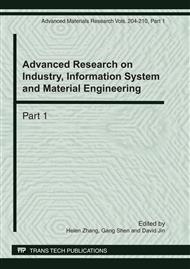p.2015
p.2019
p.2023
p.2027
p.2033
p.2041
p.2045
p.2049
p.2053
A Formal Game-Theoretic Model for Rational Exchange Protocol
Abstract:
A rational exchange protocol is a useful protocol in which two (or more) strange parties exchange their items successfully in a way that every rational party has enough reasons to follow the protocol faithfully rather than deviate from it. This means neither parties of the protocol can gain an advantage by deviating from the protocol, but he may bring a disadvantage to the other party even if who is correctly behaving party. We introduce game theory as a formal framework in this paper. We give a formal definition for the rational exchange related to the concept of the subgame perfect equilibrium of an extensive game. We use our model to analyze the Syverson protocol by the game tree and show the relationship with Buttyan's Model.
Info:
Periodical:
Pages:
2033-2040
Citation:
Online since:
February 2011
Authors:
Keywords:
Price:
Сopyright:
© 2011 Trans Tech Publications Ltd. All Rights Reserved
Share:
Citation:


